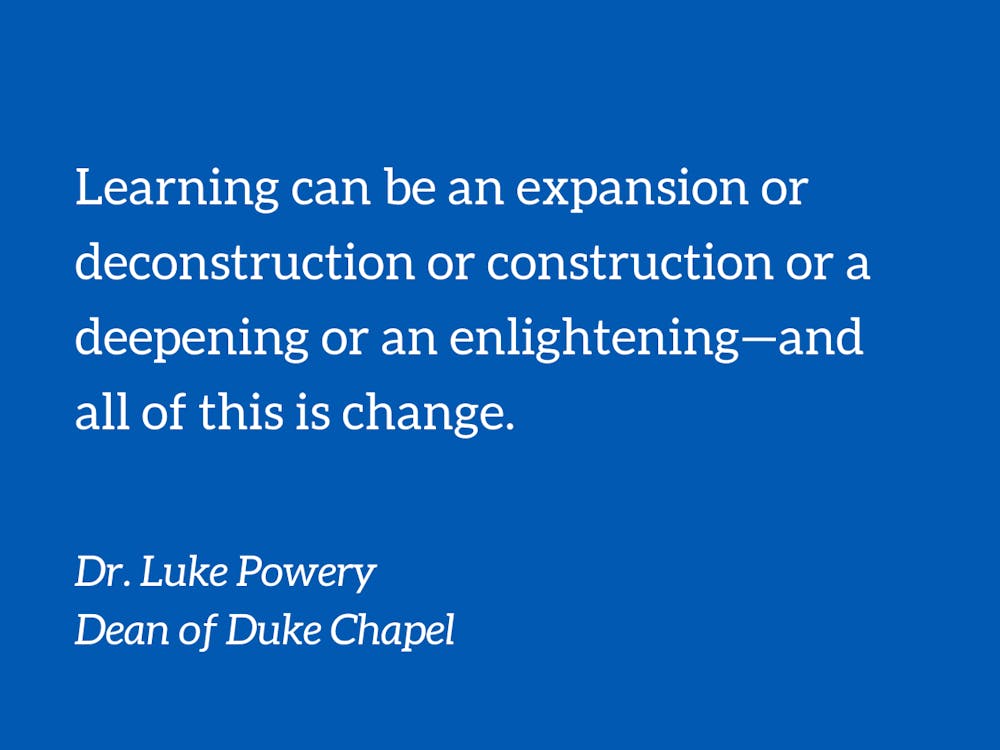Coming through a pandemic, we should be used to change by now. We’ve adapted to mask-wearing, social-distancing, hand-sanitizing, and quarantining. We have experienced food-eating together and no food-eating together, gathering and no-gathering, preschool opening and preschool closing, fist-bumping and elbow-greeting. We have been flexible with remote-working, Zoom-private-chatting-in-a-meeting, work force declining, restaurants closing, and airlines canceling.
Here at Duke things change. This academic year will not be like last academic year. Classes have changed perhaps, and new ones are being offered. Staff and administration faces—all over campus—have changed. Certain offices or center locations have changed. And those who’ve been around Duke for a while know that Duke as a whole institution has changed over the years, transforming from a regional institution into an esteemed global research university.
The truth be told, no one day is alike, so everyday there is a change—the weather changes, relationships change, and we all get older. The one constant in life is change.
As a person of faith, I’m struck when I read that God even changes. In the Book of Jeremiah in the Hebrew Bible, the prophet uses this poetic image: “The vessel [the potter] was making of clay was spoiled in the potter's hand, and he reworked it into another vessel, as seemed good to him.” In this literary context, the potter is a metaphor for God, and God, the potter, reworks the clay into another vessel. God pivoted and kept working on the clay to refashion it. God’s plans were not fixed. God changed and didn’t get stuck in a past concept or idea but reworked the clay into something else that was good. God changed God’s mind. This is explicitly said by God: “I will change my mind.”
In this metaphor, the clay is us, and the shape and design of our lives are changed. Our plans can be reworked. The major you thought you were going to pursue can change. The job you always wanted may no longer be your top priority. Your social networks may shift. Premed students may turn to law instead. English majors may shift to computer science.
There’s a story that shows the confines of a mind that doesn’t change. One day a man saw some elephants and when he passed by he noticed that these huge creatures were being held by only a small rope tied to their front leg. There were no chains or cages. It was obvious that the elephants could break away from their bonds but for some reason, they did not. He saw a trainer nearby and asked why these animals just stood there and made no attempt to get away. The trainer said, “When they are very young and much smaller, we use the same size rope to tie them and, at that age, it’s enough to hold them. As they grow up, they are conditioned to believe they cannot break away. They believe the rope can still hold them, so they never try to break free.”
Like the elephants, many of us may go through life hanging on to a belief that we cannot do something, simply because we failed at it before, or we’ve never tried. By not changing our minds, we can be stuck forever when we should really change our path, career, relationships, or opinion.
Nurture nimbleness and don’t be trapped by imagined constraints. Playwright George Bernard Shaw once said, “Those who cannot change their minds cannot change anything.” Change is always possible. What Sam Cooke sang many years ago is true about much of life: ready or not, “a change is gonna come.”
As students and educators, recognize that learning is about changing your mind. When you sit in a classroom for a lecture or small group discussion. When you read a book or an article. When you do an experiment in a lab. When you engage in research in the Perkins library archives. When you learn, it involves change. Learning can be an expansion or deconstruction or construction or a deepening or an enlightening—and all of this is change. Your mind shifts; like clay in a potter’s hands, it is reworked. And that is okay because as a caterpillar knows, it’s not until you change that you will find your wings.
This academic year, are you willing to change your mind about a subject, an issue, a person, a group, your future, your work, or God? If so, you may discover what gospel singer Tramaine Hawkins sang: “A wonderful change has come over me.”
The Rev. Dr. Luke A. Powery is Dean of Duke University Chapel. His column runs on alternate Mondays.
Get The Chronicle straight to your inbox
Signup for our weekly newsletter. Cancel at any time.

